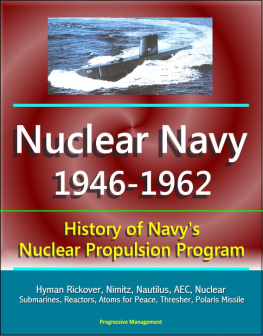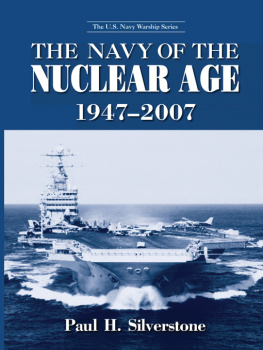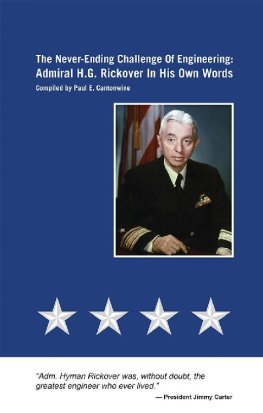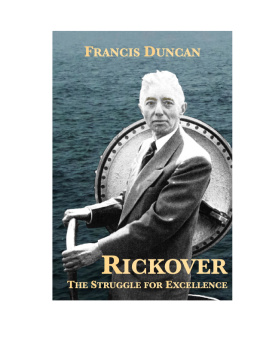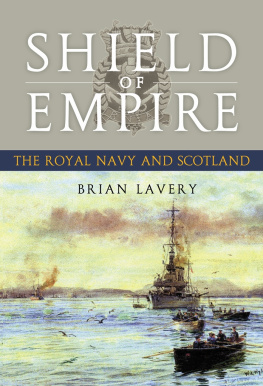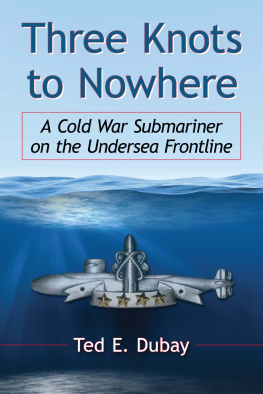


Naval Institute Press
291 Wood Road
Annapolis, MD 21402
2014 by Dave Oliver
All rights reserved. No part of this book may be reproduced or utilized in any form or by any means, electronic or mechanical, including photocopying and recording, or by any information storage and retrieval system, without permission in writing from the publisher.
Library of Congress Cataloging-in-Publication Data
Oliver, Dave, 1941
Against the tide : Rickovers leadership principles and the rise of the nuclear Navy / Rear Admiral Dave Oliver, USN (Ret.).
pages cm
Includes bibliographical references and index.
ISBN 978-1-61251-783-4 (ebook) 1. Rickover, Hyman George. 2. AdmiralsUnited StatesBiography. 3. United States. NavyOfficersBiography. 4. Nuclear submarinesUnited StatesHistory20th century. 5. Nuclear warshipsUnited StatesSafety measuresHistory. 6. Marine nuclear reactor plantsUnited StatesSafety measuresHistory. 7. United States. NavyManagement. 8. LeadershipUnited States. I. Title.
V63.R54O45 2014
359.0092dc23
[B]
2014027227

 Print editions meet the requirements of ANSI/NISO z39.48-1992 (Permanence of Paper).
Print editions meet the requirements of ANSI/NISO z39.48-1992 (Permanence of Paper).
22 21 20 19 18 17 16 15 14 9 8 7 6 5 4 3 2 1
First printing
This book is dedicated to all the men and women who aspire to leadership and did not have the privilege of personally knowing Adm. Hyman G. Rickover.
It is also dedicated to the woman who reared our two sons by adapting and circumscribing her own professional careerwhich nevertheless included being licensed by the bars of California, Washington, Idaho, Hawaii, Virginia, and the District of Columbia and becoming the first female chief executive officer of a major company in Japan, first general counsel of the Naval Criminal Investigative Service, associate administrator of the White House Office of Federal Procurement Policy, and deputy and acting director of the Department of Defense Office of Small Business Programsso I could participate in one of the most exciting periods in the Navy.
Thank you, Linda Bithell Oliver.
Contents
As I hope will become evident, Admiral Rickover not only affected how America acted but also how we saw ourselves during a period that much of the world was looking to the United States for leadership. Because of the wide effect the Admiral had I asked a wide spectrum of people to provide their thoughts and comments on this manuscript. Individuals of particular assistance included:
Jim Bailey, Kitty Bean, Jim Blaker, Barry Blechman, Irv Blickstein, Gina Bova, Jay Cohen, Mike Conners, Tom Dugan, Jeff Fowler, Jack Gansler, Paul Gilchrist, Earl Griggs, Mike Hough, Bill Houley, Peter and Rose Mary Hughes, Aaron Johnson, Chris Johnson, Ellie Johnson, David Jones, Bud Kauderer, Jim McAleese, Frank Miller, Vago Muradian, Linda and Tim Oliver, Gina and Michael Pack, Margo Parker, Fred Rainbow, Bob Riley, Ted Rockwell, Steve Spruill, Harlan Ullman, Mitzi Wertheim, and Leslie Zimring.
I thank each of you.
And with special thanks to Mrs. Eleonore B. Rickover, who is a personal reminder of the admirals focus on excellence.

H yman G. Rickover was the most famous and controversial admiral of his era. He transformed warfare and, in doing so, changed the U.S. Navy, American education, and the defense industry. Rickover conceived and built the worlds first nuclear-powered submarine. This gave America a clear technical lead and military superiority at sea over our one peer competitor, the Soviet Union. To make this technical innovation feasible, Rickover cajoled the American public into insisting on better education. This provided him the qualified sailors he needed to staff his ships. Concurrently, he threatened industry as necessary to improve its practices so companies were technically prepared to build safer submarines. Rickover demanded that both academe and industry reach higher than they were comfortable. As might be expected, many in both professions mightily resisted. These conflicts made newspaper headlines.
Within the American Navy, Rickover personally monitored the progress and career of every nuclear-trained officer and demanded continuous improvement of each of themin fact, his numerous critics were certain he spent his life inappropriately micromanaging the entire submarine force. Even though Rickovers peers loved to hate him, the fruit of his labor was the most powerful naval force the world has ever seen. Before he died, Americas underwater fleet controlled each of the seven seas and had irrevocably changed warfare.
No one could have foretold that Rickover would be a success. He did not rise by a conventional path. He was (at best) a late bloomer. During the first two decades of his career, he performed poorly in the very two roles the Navy most values and rewardscommand at sea and performance under fire. No matter how rosy the observers glasses, Rickover was definitely not the warfighter the Navy professed to desire. As a result, during the long years of World War II, Rickover was not assigned within echo distance of the sound of guns.
Nevertheless, by the time he died, Rickover had become one of the very few advanced to four-star admiral rank, and his accomplishments were legendary in naval circles. He was known throughout the world for managing a revolutionary technology from start-up to maturity, altering the culture of a most conservative corporate organization, and shaping the outcome of the Cold War.
Along with his record of extraordinary achievement, Rickover left behind a legacy of knowledge applicable to every organization today. One doesnt need to understand radioactivity to learn lessons from the admiral. Yet, despite his success, few outside the American submarine force use his unique management techniques. Why? Did people hate him so much they could ignore the success of his methods? Do they understand what he accomplished?
Rickover forced a change in the U.S. Navys culture. In doing so he made many enemies. His adversaries attacked with the viciousness and mindlessness of a pack of stray dogs. Unfortunately, since Rickover chose never to personally answer his critics, false stories continue to be told. Obscuring the truth even more, Rickover wrote no autobiography to set the record straight, and many of his achievements were deeply buried in the vaults of Cold War secrecy.
But the Cold War is now long over, and several of Rickovers peers have contributed to history with biographies, memoirs, or oral reminiscences. At the same time, years have passed. Is a fair evaluation of his methods now even possible, or have the facts become obscured by the swirling of time and the dark of death? To use a boxing analogy, is it even possible to gauge Rickovers tale of the tape?
Yes!
The best measurement involves reactor accidents. This metric is itself sensitive. The world contains adamant supporters of nuclear power as well as diehard opponents. Both camps sometimes even have difficulty speaking to one another in a civil tone. However, I think each would agree that a nuclear submarine provides grand warfighting capabilities for a nationalong with the downside of the danger of a possible reactor accident.
Next page

